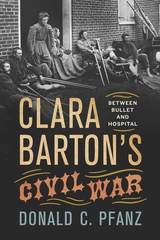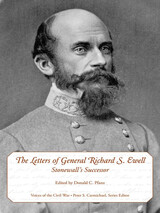2 books about Pfanz, Donald C.

Clara Barton's Civil War
Between Bullet and Hospital
Donald C. Pfanz
Westholme Publishing, 2018
Through Battle Dispatches, Letters, and Other Records, Discovering the Wartime Service of America’s Most Famous Nurse
“I always tried to succor the wounded until medical aid and supplies could come up—I could run the risk; it made no difference to anyone if I were shot or taken prisoner.” So recorded Clara Barton, the most famous woman to emerge from the American Civil War. In an age when few women worked in hospitals, much less at the front, Barton served in at least four Union armies, providing food and assistance to wounded soldiers on battlefields stretching from Maryland to South Carolina. Thousands of soldiers benefited from her actions, and she is unquestionably an American heroine. But how much do we really know about her actual wartime service? Most information about Barton’s activities comes from Barton herself. After the war, she toured the country recounting her wartime experiences to overflowing audiences. In vivid language, she described crossing the Rappahannock River under fire to succor wounded Union soldiers at Fredericksburg, transporting critical supplies to field hospitals at Antietam, and enduring searing heat and brackish water on the sunscorched beaches of South Carolina. She willingly braved hardship and danger in order to help the young men under her care, receiving in return their love and respect. Most of Barton’s biographers have accepted her statements at face value, but in doing so, they stand on shaky ground, for Barton was a relentless selfpromoter and often embellished her stories in an effort to enhance her accomplishments.
In Clara Barton’s Civil War: Between Bullet and Hospital, distinguished historian Donald Pfanz revisits Barton’s claims, comparing the information in her speeches with contemporary documents, including Barton’s own wartime diary and letters. In doing so, he provides the first balanced and accurate account of her wartime service—a service that in the end needed no exaggeration.
“I always tried to succor the wounded until medical aid and supplies could come up—I could run the risk; it made no difference to anyone if I were shot or taken prisoner.” So recorded Clara Barton, the most famous woman to emerge from the American Civil War. In an age when few women worked in hospitals, much less at the front, Barton served in at least four Union armies, providing food and assistance to wounded soldiers on battlefields stretching from Maryland to South Carolina. Thousands of soldiers benefited from her actions, and she is unquestionably an American heroine. But how much do we really know about her actual wartime service? Most information about Barton’s activities comes from Barton herself. After the war, she toured the country recounting her wartime experiences to overflowing audiences. In vivid language, she described crossing the Rappahannock River under fire to succor wounded Union soldiers at Fredericksburg, transporting critical supplies to field hospitals at Antietam, and enduring searing heat and brackish water on the sunscorched beaches of South Carolina. She willingly braved hardship and danger in order to help the young men under her care, receiving in return their love and respect. Most of Barton’s biographers have accepted her statements at face value, but in doing so, they stand on shaky ground, for Barton was a relentless selfpromoter and often embellished her stories in an effort to enhance her accomplishments.
In Clara Barton’s Civil War: Between Bullet and Hospital, distinguished historian Donald Pfanz revisits Barton’s claims, comparing the information in her speeches with contemporary documents, including Barton’s own wartime diary and letters. In doing so, he provides the first balanced and accurate account of her wartime service—a service that in the end needed no exaggeration.
[more]

The Letters of General Richard S. Ewell
Stonewall’s Successor
Donald C. Pfanz
University of Tennessee Press, 2012
“The Letters of General Richard S. Ewell provide a sweeping view of the nineteenth century. Such chronological breadth makes this volume truly exceptional and important. Through Ewell’s eyes we see the many worlds of an American people at war. His thoughtful observations, biting wit, and ironic disposition offer readers a chance to rethink the paper-thin generalizations of Ewell as a quirky neurotic who simply crumbled under the legacy of Stonewall Jackson.” —from the foreword by Peter S. Carmichael
Richard S. Ewell was one of only six lieutenant generals to serve in Lee’s Army of Northern Virginia, and of those he was but one of two—the other being Stonewall Jackson, his predecessor as commander of the Second Corps—to have left behind a sizable body of correspondence. Forty-nine of Ewell’s letters were published in 1939. This new volume, drawing on more recently available material and scrupulously annotated by Ewell biographer Donald Pfanz, offers a much larger collection of the general’s missives: 173 personal letters, 7 official letters, 4 battle narratives, and 2 memoranda of incidents that took place during the Civil War.
The book covers the full range of Ewell’s career: his days at West Point, his posting on the western frontier, his role in the Mexican War, his Civil War service, and, finally, his postwar years managing farms in Tennessee and Mississippi. Some historians have judged Ewell harshly, particularly for his failure to capture Cemetery Hill on the first day at Gettysburg, but Pfanz contends that Ewell was in fact a brilliant combat general whose overall record, which included victories at the battles of Cross Keys, Second Winchester, and Fort Harrison, was one of which any commanding officer could be proud. Although irritable and often critical of others, Ewell’s correspondence shows him to have been generous toward subordinates, modest regarding his own accomplishments, and upright in both his professional and personal relationships. His letters to family and friends are a mixture of wry humor and uncommon sense. No one who reads them will view this important general in quite the same way again.
DONALD C. PFANZ is the author of Richard S. Ewell: A Soldier’s Life, Abraham Lincoln at City Point, and War So Terrible: A Popular History of the Battle of Fredericksburg.
Richard S. Ewell was one of only six lieutenant generals to serve in Lee’s Army of Northern Virginia, and of those he was but one of two—the other being Stonewall Jackson, his predecessor as commander of the Second Corps—to have left behind a sizable body of correspondence. Forty-nine of Ewell’s letters were published in 1939. This new volume, drawing on more recently available material and scrupulously annotated by Ewell biographer Donald Pfanz, offers a much larger collection of the general’s missives: 173 personal letters, 7 official letters, 4 battle narratives, and 2 memoranda of incidents that took place during the Civil War.
The book covers the full range of Ewell’s career: his days at West Point, his posting on the western frontier, his role in the Mexican War, his Civil War service, and, finally, his postwar years managing farms in Tennessee and Mississippi. Some historians have judged Ewell harshly, particularly for his failure to capture Cemetery Hill on the first day at Gettysburg, but Pfanz contends that Ewell was in fact a brilliant combat general whose overall record, which included victories at the battles of Cross Keys, Second Winchester, and Fort Harrison, was one of which any commanding officer could be proud. Although irritable and often critical of others, Ewell’s correspondence shows him to have been generous toward subordinates, modest regarding his own accomplishments, and upright in both his professional and personal relationships. His letters to family and friends are a mixture of wry humor and uncommon sense. No one who reads them will view this important general in quite the same way again.
DONALD C. PFANZ is the author of Richard S. Ewell: A Soldier’s Life, Abraham Lincoln at City Point, and War So Terrible: A Popular History of the Battle of Fredericksburg.
[more]
READERS
Browse our collection.
PUBLISHERS
See BiblioVault's publisher services.
STUDENT SERVICES
Files for college accessibility offices.
UChicago Accessibility Resources
home | accessibility | search | about | contact us
BiblioVault ® 2001 - 2024
The University of Chicago Press









